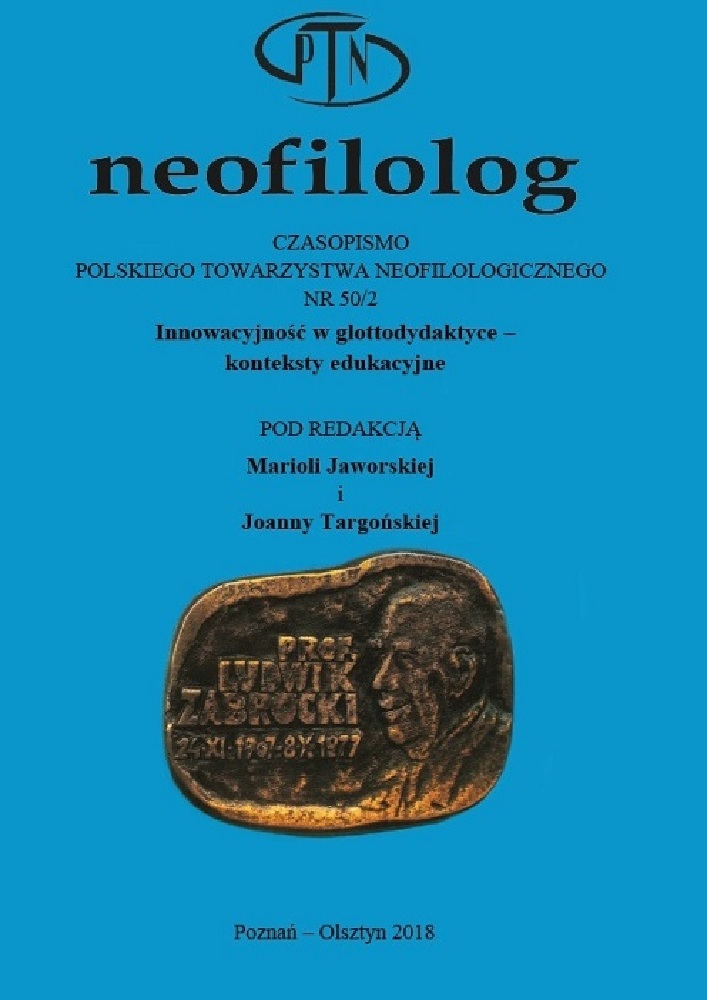Résumé
The purpose of this paper is to indicate an ambiguous understanding of the notion of innovation in education and misunderstandings connected with it. It also involves a critical analysis of the main sources of difficulty in choosing and executing pedagogical innovations, as well as encourages reflection on and mobilisation for self-preparedness to make changes in the profession. This paper will discuss arguments confirming the necessity of innovative actions in education. Examples of actual innovative actions and ostensible actions/pseudo-innovations will be given, characteristics of innovators and “Pharisees of innovation” will be presented. This paper will also demonstrate the possibilities of organising pedagogical innovations efficiently, and the possible support for innovative teachers, leading to the increase in the efficiency of their actions.
Références
Brzeziński M. (2009), Organizacja kreatywna. Warszawa: Wydawnictwo Naukowe PWN.
Drozdowski R. i in. (2010),Wspieranie postaw proinnowacyjnych przez wzmacnianie kreatywności. Warszawa: Polska Agencja Rozwoju Przedsiębiorczości.
Dudzikowa M. (2013), Użyteczność pojęcia działań pozornych jako kategorii analitycznej. Egzemplifikacje z obszaru edukacji (i nie tylko) (w) Dudzikowa M.,
Knasiecka-Falbierska K. (red.), Sprawcy i/lub ofiary działań pozornych w edukacji szkolnej. Kraków: Oficyna Wydawnicza Impuls, s. 28-82.
Jastrzębska E. (2013), Przygotowanie do twórczości pedagogicznej w kształceniu wstępnym nauczycieli języków obcych (w) „Neofilolog”, nr 40/2, s. 319-332.
Komorowska H. (2015), Rola nauczyciela, mity i slogany a rzeczywistość (w) „Neofilolog”, nr 45/2, s. 143-155.
Kotarba-Kańczugowska M. (2009), Innowacje pedagogiczne w międzynarodowych raportach edukacyjnych. Warszawa: Wydawnictwo Akademickie ŻAK.
Kwiatkowska H. (2005), Tożsamość nauczycieli. Między anomią i autonomią. Gdańsk: Gdańskie Wydawnictwo Psychologiczne.
Kwiatkowska H. (2008), Pedeutologia. Warszawa: Wydawnictwa Akademickie i Profesjonalne.
Kwiatkowski S. (1990), Społeczeństwo innowacyjne. Warszawa: PWN.
Łobocki M. (2000), Metody i techniki badań pedagogicznych. Kraków: Oficyna Wydawnicza Impuls.
Pietrasiński Z. (1971), Ogólne i psychologiczne zagadnienia innowacji. Warszawa: PWN.
Przyborowska B. (2013), Pedagogika innowacyjności – między teorią a praktyką. Toruń: Wydawnictwo Naukowe Uniwersytetu Mikołaja Kopernika.
Puślecki W. (1992), Kompetencje innowacyjne nauczycieli – wymogi programowe i stan faktyczny (w) Schulz R. (red), Kształcenie dla innowacji pedagogicznych. Toruń: Wydawnictwo Naukowe Uniwersytetu Mikołaja Kopernika, s. 33-39.
Rusakowska D. (1995), W stronę edukacyjnego dyskursu nowoczesności. Warszawa: Instytut Badań Edukacyjnych.
Smak E. (2014), Innowatyka w edukacji. Opole: Wydawnictwo Nowik.
Śliwerski B. (1998), Jak zmieniać szkołę? Kraków: Oficyna Wydawnicza Impuls, s. 139-148.
Śliwerski B. (2013), Pozory sprawstwa reform oświatowych w III RP (w) Dudzikowa M., Knasiecka-Falbierska K. (red.), Sprawcy i/lub ofiary działań pozornych w edukacji szkolnej. Kraków: Oficyna Wydawnicza Impuls, s. 103-130.
Śliwerski B. (2017a), Dydaktycy przedmiotowi. Online: http://sliwerski-pedagog.blogspot.com/2017/06/dydaktycy-przedmiotowi.html [DW 6.06.2017].
Śliwerski B. (2017b), Kto nie z MEN, ten nie ten. Online: sliwerski-pedagog.blogspot.com/2017/05/ [DW 28.05.2017].
Zawadzka-Bartnik E. (2015), Czego powinniśmy uczyć a czego uczymy – rozważania o edukacyjnych złudzeniach (w) „Neofilolog”, nr 44/2, s. 139-153.
Licence
© Elżbieta Zawadzka-Bartnik 2018

Ce travail est disponible sous licence Creative Commons Attribution - Pas de Modification 4.0 International.
Auteurs :
Les auteurs de textes acceptés pour publication dans la revue Neofilolog sont tenus de remplir, signer et renvoyer à l'adresse de la rédaction, un accord sur l'octroi d'une licence gratuite pour les œuvres, avec obligation d'accorder une sous-licence CC.
En vertu de cet accord, les auteurs des textes publiés dans la revue Neofilolog accordent à l'Université Adam Mickiewicz de Poznań une licence non exclusive et gratuite et permettent l'utilisation de la sous-licence Creative Commons Attribution-NoDerivatives 4.0 International (CC BY-ND 4.0).
Les auteurs se réservent le droit de disposer librement de l'œuvre.
Utilisateurs :
Les utilisateurs d'Internet intéressés ont le droit d'utiliser les œuvres publiées à partir de l'année 2017 sous réserve des conditions suivantes :
- reconnaissance de la qualité d'auteur - l'obligation de fournir des informations sur la qualité d'auteur, le titre, la source (liens vers l'œuvre originale, DOI) et la licence, ainsi que l'œuvre distribuée ;
- sans créer d'œuvres dérivées - l'œuvre doit être conservée dans sa forme originale, p. ex. les traductions ou les interprétations ne peuvent être distribuées sans le consentement de l'auteur.
Tous les textes publiés sont soumis au droit d'auteur.
Autres :
L'Université Adam Mickiewicz de Poznań se réserve le droit à la revue dans son ensemble (mise en page, forme graphique, titre, conception de la couverture, logo, etc.).
.
